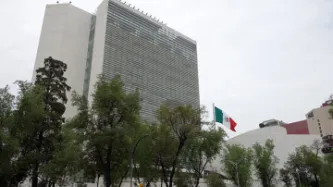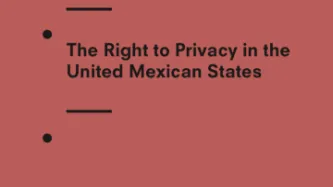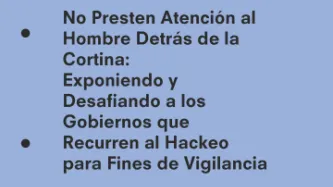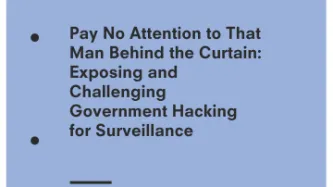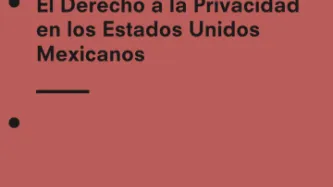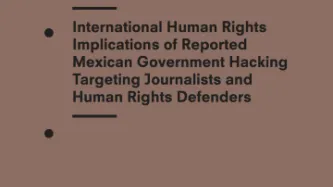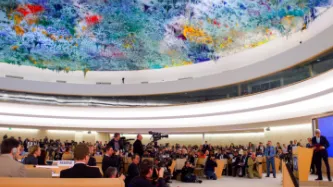Search
Content type: Advocacy
Some of the most vulnerable groups in Mexico are amongst the groups at risk from a draft General Population Law that creates a biometric “Unique Digital Identity Card” (CUID), argue civil society organisations. The proposed law has now reached the senate, and has raised serious concerns from civil society organisations. Led by our global partner in Mexico Red en Defensa de los Derechos Digitales (R3D), PI along with 25 organisations have signed a joint letter to the members of the senate,…
Content type: Examples
On 21 April 2020, it was published in the Official Gazette of Mexico City that 4,264 non-salaried workers would be granted basic economic support in a single payment to cope with the health emergency.
The Ministry of Labour and Employment Promotion (STyFE) had the possibility to launch this programme, due to the registration it has as it is in charge of granting work licenses. That is why they decided to grant it to 4,264 people with valid or pending credentials and for whom a budget of 6,396,…
Content type: Examples
The Manchester-based cybersecurity company VST Enterprises is working a digital health company Circle Pass Enterprises to create the “Covi-pass” digital health passport intended to allow holders to work and travel safely. The Covi-pass uses a colour system of red, green, and amber to indicate whether the holder has tested positive or negative for the coronavirus, and holds other key information such as name, address, and age, plus a biometric. Despite the challenge of sourcing enough…
Content type: Examples
As part of Mexico City's March 31 lockdown, which shut all shops except those relating to health, food, and essential services, telephone companies will provide access to cell phone antennas to enable the Digital Agency of Public Innovation to monitor movement and personal contact. The information will be aggregated by antenna and anonymised for analysis.
Source: https://cdmx.gob.mx/portal/articulo/cierre-de-centros-comerciales-por-emergencia-sanitaria
Writer: Mexico City government…
Content type: Examples
A web form to screen COVID-19 cases developed by the Mexico City government collects a wide range of personal information such as name, age, telephone number, home address, social network username, and cellphone number. The privacy notice establishes that such data may be transferred to a vast array of judicial and administrative federal and local authorities.
Source: https://test.covid19.cdmx.gob.mx/
Writer: Mexico City government
Publication: Mexico City government
Content type: Examples
In late 2017, the residents of the small town of Santa Maria Tonantzintla, about three-hours away from Mexico City, discovered their town was intended to become a pilot smart city in a collaboration between the state of Puebla and the organisation Alianza Smart Latam. The town's residents, who had already lost its distinctive cobblestones, the clock tower, and a stucco bridge as part of the early stages of the project, filed an injunction to halt the project, which had failed to obtain the…
Content type: News & Analysis
Privacy International welcomes WhatsApp's immediate reaction after the revelation that Israeli cyber intelligence company NSO group had exploited a vulnerability in their software. We encourage all WhatsApp users to update their app as soon as possible. However, we believe WhatsApp needs to be much more transparent with their users. We haven't seen a notification on the app itself that would inform users about both, the bug, and the fix. The current version merely states that you can now see…
Content type: Examples
In Mexico, people registered as beneficiaries of any programmes led by the Ministry of Social Development could obtain a TV set, as part of the transition from analogue to digital TV organised by the Ministry of Communications and Transportation. Yet, the Ministry of Communications and Transportation requested the collection of fingerprints, the scanning of the beneficiary’s voter card and the beneficiary’s address in exchange of the TV set. The company Codigo Empresarial SA de CV was tasked…
Content type: Long Read
The Privacy International Network is celebrating Data Privacy Week, where we’ll be talking about how trends in surveillance and data exploitation are increasingly affecting our right to privacy. Join the conversation on Twitter using #dataprivacyweek.
It is no mystery that data exploitation is part of most consumer-oriented tech companies’ business models. A big part of our lives is recorded and exploited, from our web searches, to our personal communications, location, and our shopping habits…
Content type: State of Privacy
Table of contents
Introduction
Right to Privacy
Communication Surveillance
Data Protection
Identification Schemes
Policies and Sectoral Initiatives
Introduction
Acknowledgement
The State of Privacy in Mexico is the result of an ongoing collaboration by Privacy International and Red in Defensa de los Derechos Digitales (R3D) in Mexico.
Key Privacy Facts
1. Constitutional privacy protections: The right to privacy is enshrined in article 6 of the Mexican constitution.
2. Data…
Content type: News & Analysis
Photo credit: US Immigration and Customs Enforcement
The trial of Mexican drug lord Joaquin “El Chapo” Guzman started in New York back in November 2018. But last week, the jurors were presented with a trove of new key evidence: dozens of text messages exchanged between Guzman, his wife, and his mistresses.
The reason behind this set of revelations? Guzman had been spying on his wife and mistresses, using publicly-available surveillance software called FlexiSpy. Once installed on his targets…
Content type: Advocacy
This report is presented by Red en Defensa de los Derechos Digitales (R3D) and Privacy International (PI). La Red en Defensa de los Derechos Digitales (R3D) is a non-governmental, non-profit organisation located in Mexico, dedicated to the defence of human rights in the digital environment. Privacy International (PI) is a non-governmental, non-profit organisation located in London, focused on the defence, promotion and protection of the right to privacy around the world.
PI and R3D wish to…
Content type: Advocacy
Tanto la privacidad como la seguridad son esenciales para proteger a los individuos, su autonomía y su dignidad. El detrimento de la privacidad implica el detrimento de la seguridad de los individuos, sus dispositivos y la infraestructura de la que forman parte. La gente necesita privacidad para sentirse libremente segura y proteger su información, así como para gozar plenamente de otros derechos.
Una cantidad cada vez mayor de Gobiernos en el mundo está recurriendo también al hackeo para…
Content type: Advocacy
Privacy and security are both essential to protecting individuals, including their autonomy and dignity. Undermining privacy undermines the security of individuals, their devices and the broader infrastructure. People need privacy to freely secure themselves, their information, and fully enjoy other rights.
A growing number of governments around the world are embracing hacking to facilitate their surveillance activities. When governments hack for surveillance purposes, they seek to…
Content type: Advocacy
Este informe es presentado por la Red en Defensa de los Derechos Digitales (R3D) y Privacy International (PI). La Red en Defensa de los Derechos Digitales (R3D) es una organización no gubernamental, sin fnes de lucro, ubicada en México, dedicada a la defensa de los derechos humanos en el entorno digital. Privacy International (PI) es una organización no gubernamental sin fnes de lucro ubicada en Londres enfocada en la defensa, promoción y protección del derecho a la privacidad alrededor del…
Content type: Long Read
Privacy International is celebrating Data Privacy Week, where we’ll be talking about privacy and issues related to control, data protection, surveillance and identity. Join the conversation on Twitter using #dataprivacyweek.
Exercising the right to privacy extends to the ability of accessing and controlling our data and information, the way it is being handled, by whom, and for what purpose. This right is particularly important when it comes to control of how States perform these activities.…
Content type: Advocacy
On 28 June 2017, Privacy International sent a letter and briefing to the Mexican government following reports indicating that Mexican authorities had used NSO Group’s Pegasus spyware to target journalists and human rights defenders working to expose government corruption and human rights abuses. NSO Group is a surveillance technology company that sells products and services, including malware, exclusively to government clients.
These attacks were designed to compromise the mobile phones of…
Content type: News & Analysis
A few weeks ago we wrote about a landmark opportunity the Mexican Supreme Court had to set a precedent by taking a strong stand against mass surveillance.
Last Wednesday, the Second Chamber of the Supreme Court of Mexico came to a disappointing decision for the protection of privacy, and for democracy in Mexico, by rejecting to challenge of the mass, unregulated, unchecked data retention provision that currently exists under the Federal Telecommunications Act. The …
Content type: News & Analysis
This week the Mexican Supreme Court will issue its judgement on the country’s data retention. It will decide on an injunction against the provisions of the the Federal Telecommunications Act known as the ‘Ley Telecom’. The Act requires all telephone companies and internet service providers to retain user communications data for a period of 24 months.
Following the failure of the National Human Rights Commission (CNDH) and the Federal Institute for Access to Public Information and Data…
Content type: News & Analysis
In the coming year, the elections to be held in Nigeria, Indonesia, Turkey, Ethiopia, Mexico, and Tunisia will be closely watched. Not only will the international community be monitoring the elections, but domestic governments could be monitoring their own citizens at the ballot box.
When courageous citizens brave uncertain political and societal contexts to exercise one of their fundamental human rights - the right to vote - they will rely on another fundamental human right - privacy. Privacy…
Content type: News & Analysis
Following reports that the Mexican prosecution authority appears to be not only using FinFisher, but also to be involved in a corruption scandal surrounding the purchase of this intrusive surveillance technology, the Mexican Permanent Commission (composed of members of the Mexican Senate and Congress) has urged Mexico's Federal Institute for Access to Public Information and Data Protection (IFAI) to investigate the use of spyware in Mexico.
The corruption scandal, which entails the…
Content type: News & Analysis
Privacy International this week submitted stakeholder reports to the United Nations Human Rights Council1 about the human rights records of China, Senegal and Mexico. The reports, prepared in preparation with our partners in the respective countries, analyse the extent to which the right to privacy is respected and protected, and detail instances of privacy violations.
The stakeholder reports will inform the questions asked by members of the Human Rights Council when China, Senegal and…
Content type: Advocacy
This stakeholder report is submitted jointly by Privacy International (PI), a human rights organisation that works to advance and promote the right to privacy and fight surveillance around the world. PI wishes to bring concerns about the protection and promotion of the right to privacy in Mexico before the Human Rights Council for consideration in Mexico’s upcoming review.
